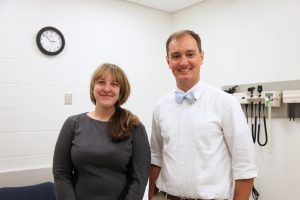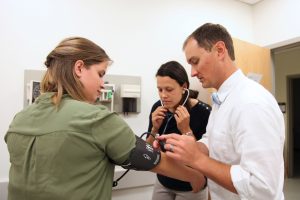The first class of 13 MedServe fellows is participating in a two-week training institute in Chapel Hill from June 20 to July 1 before joining clinics across the state for two years.


The goal of MedServe, which is akin to “Teach for America for medical professionals,” is to improve the health of communities across North Carolina, while exposing promising future doctors to the impact that a primary care physician can make in a community.
MedServe’s founders Patrick O’Shea, a dual MD/MBA student from the UNC School of Medicine and Duke’s Fuqua School of Business, and Anne Steptoe, a dual MD/MBA student from Brown University’s Alpert School of Medicine and Duke’s Fuqua School of Business, both benefitted from transformative service experiences prior to entering medical school.
“Anne and I were both lucky enough to have incredible experiences that helped cement our desire to go into medicine while also serving others,” said O’Shea, who participated in Teach for America from 2008-2011 as a science teacher in Henderson, NC. “Our goal is to make sure our fellows have those types of experiences while also gaining the hands-on clinical training that will directly prepare them for medical school and careers in medicine.”
MedServe’s launch comes at a time when just 12 percent of medical students nationwide are choosing to enter primary care. Steptoe said she hopes exposing students to opportunities like this even before entering medical school can help increase that number. Organizers also hope a successful launch will create momentum to spur expansion of the program to include more fellows and clinics and possibly, more states in the future.
“Traditionally, medical education and the work of primary care physicians in smaller communities have been separate,” Steptoe said. “We believe that by showing our fellows the best of rural and community-based primary care, we can encourage the next generation of primary care physicians to think more broadly about where their career in medicine can occur.”
The appetite for the program is underscored by the response of applicants, the positive reception Steptoe and O’Shea received when pitching the idea to clinical partners, and the funding they have secured from a combination of governmental, corporate, and private philanthropic sources.
In its first year, MedServe received more than 80 applications for its 13 available slots.
This inaugural group includes a mix of graduates from many North Carolina universities including UNC-Chapel Hill, NC State, Duke, Wake Forest, East Carolina, and UNC-Pembroke, as well as Ivy League institutions including Harvard, Yale and Brown. The fellows are at the UNC School of Medicine June 20 – July 1 for a training institute where they will hear from physicians and public health leaders while also getting hands-on instruction in the UNC School of Medicine Clinical Skills and Patient Simulation Center.
Then, in July, the fellows will begin their two year experience living and working in rural or medically underserved communities across North Carolina. This includes towns like Hayesville, with a population of less than 500 located at the western tip of the state, to underserved urban areas like Southeast Raleigh, to small eastern NC towns like Williamston.
“What I love about MedServe is the opportunity that I’ll have to spend two years dedicated to growing as a person both in the clinic and as part of the community,” said Allison Draper, a 2016 Duke graduate who will serve at Integrative Family Medicine of Asheville. “I had always planned to take some time between completing college and entering medical school. This presents the opportunity to really make that time count.”
Jiyun Chang, a 2016 Harvard graduate, will be working at Advance Community Health in Southeast Raleigh.
“During my time in Raleigh, I hope to learn the best ways to effectively communicate with patients to help them proactively make plans and commit to the things that will keep them healthy,” Chang said. “I hope my career in medicine will focus on promoting preventative care through education and outreach. MedServe will be a great way to start.”
Eugene Maynard Jr, MD, a UNC School of Medicine alumnus, will welcome two MedServe fellows to his practice, the Benson Area Medical Center, in Benson, NC.
“This program is a great opportunity for the students to be exposed to all of the human elements that go into the practice of medicine,” Maynard said. “You’ll get the science in medical school, but being a physician is an art as much as a science. The most important thing we do is connect with our patients in order to get them to buy into what we know will help them. You can have the greatest training in the world, but if you can’t connect with patients it’s all wasted.”
Steptoe and O’Shea hope the process of selecting the initial class of fellows helps ensure the success of the program. After conducting the initial screening interviews, the founders matched potential fellows with clinical sites based on the sites’ stated needs. The clinics were then able to make the final hiring decisions. Maynard, for example, wanted fellows who are fluent in Spanish who could assist with the practice’s clinic for local farm workers, many of whom are Hispanic. The fellows who will be working in his clinic, Natalie Malpass, an ECU graduate, and Andrew Marburg, a Wilmington native who recently graduated from Yale, are fluent Spanish speakers.
“Many of our partner clinics already have in place the types of community care solutions all potential medical students and physicians could learn from,” O’Shea said. “So, we see the great potential for the future of this program and can’t wait to get started.”
MedServe is funded by the NC Office of Rural Health, the Kenan Charitable Trust, the Blue Cross and Blue Shield of NC Foundation, the University of North Carolina, the UNC School of Medicine, Duke University, Duke Health System, and Duke’s Fuqua School of Business. To learn more about MedServe, click here.